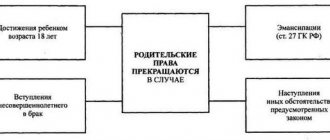Debt on alimony
Family law obliges each parent to support their own child equally. If parents cannot agree on the terms of payment on their own, such order and conditions are determined by the court when assigning alimony. They are periodic payments due monthly. Control over transfers, if enforcement proceedings have been initiated, is carried out by bailiffs - they request a report on transfers at the payer’s place of work, or the payer himself reports them to the FSSP.
If the funds stop arriving, starting next month the bailiff will accrue the alimony debt to the alimony provider. The longer the debtor continues to evade, the greater his debt will be. The reasons why he does not pay do not matter; the debt increases in proportion to the number of overdue months.
The formed debt will subsequently be collected not at the expense of labor income, but at the expense of the debtor’s liquid property.
Responsibility for draft dodgers
In addition to the seizure of property and foreclosure, the debtor can expect other forms of deprivation, including:
- Civil liability: allows any alimony collector, in the event of arrears, to demand from the alimony provider payment of a penalty, the amount of which is fixed at 0.5% of the debt per day of delay;
- Administrative punishment: allows the evader to be subject to administrative punishment if the period of non-payment after the start of compulsory execution exceeds 2 months. The debtor faces forced labor, a fine or administrative arrest.
- Criminal liability: threatens the debtor with criminal punishment if he does not start paying even after an administrative penalty has been imposed. The draft dodger faces correctional or forced labor, arrest, or even imprisonment.
Interestingly, malicious evasion can simultaneously cause other restrictions, for example, deprivation of parental rights. Let's take a closer look.
Why do they deprive
As we have already said, deprivation of parental rights (DPR) is an exceptional form of parental responsibility imposed on persons who improperly fulfill their parental responsibilities. Given the nature of the liability measure, it has a limited list of grounds for application, including:
- refusal to pick up a child from a maternity hospital, hospital or social service organization;
- abuse of rights;
- child abuse;
- suffering from chronic forms of alcohol or drug addiction;
- an attack on the life or health of a child, second parent, spouse or other relative;
- avoidance of parental obligations, for example, child support.
At the same time, alimony debts cannot always serve as a basis for the application of this particular measure of responsibility. The answer to the question whether parental rights can be deprived for failure to pay child support depends on the nature of the evasion and the reasons for it, but more on that later. Read more about how deprivation of parental rights occurs.
Jurisdiction
In accordance with the requirements of Art. 28 of the Code of Civil Procedure, a claim for deprivation of paternity is sent to the city or district court at the place where the defendant lives. If his location at a given time is unknown, it is allowed to submit documents at the address of his previous registration. At the same time, a persistent non-payer of alimony is put on the wanted list.
If, even for good reasons, the plaintiff cannot independently attend meetings during the consideration of the case, he will have to entrust this to another person by issuing a notarized power of attorney.
If there are other claims that require filing an application at the place of registration of the plaintiff, you can combine several claims into one and send them to this address. This is stated in articles 24, 28 and 29 of the Code of Civil Procedure.
Legislative framework
The basis of domestic legislation on PRP is. In particular, it determines the grounds for such deprivation, establishes general rules for the procedure, and regulates the consequences that will occur as a result of such deprivation.
The second document, the content of which has a direct impact on the procedure, is. In particular, it explains some features, clarifies the grounds for removal from raising children and helps to understand whether the parent will be held accountable.
Since the issue of removal from education requires litigation, it is also fair to mention. In particular, it determines the procedure for applying to court for PRPs, and all subsequent chapters regulate the further procedure for considering the case.
Next, we propose to dwell in more detail on the deprivation procedure justified by non-payment of alimony.
Statement of claim
In this matter, the correct drafting of the claim is important. Now we are not talking about the rules of grammar, but specifically about the essence of the statement. After all, the court will take into account these circumstances based on the order and logic of explaining its claim. So, the statement of claim must contain:
- the name of the document, the body to which it is submitted, as well as the personal data of both parties – yours and your father’s;
- state the essence of the claim - what you want from the court hearing;
- describe the reason for going to court, the other party’s violation of legislative articles, and, if possible, refer to them;
- if a decision has already been made to collect alimony, which is not being implemented, then its data must be rewritten;
- if the defendant has already been held accountable for non-payment, then it is also necessary to rewrite the data from the writ of execution;
- attach a list of documents confirming this application for deprivation of parental rights, as well as evidence of the father’s insolvency.
The statement of claim, along with all the necessary documents, is submitted to the court office. If the application is written incorrectly, or if any claims arise regarding the package of documents, the case will be returned to you and it will not be subject to consideration. In order not to encounter such a problem at the very first stage, when submitting an application to the relevant executive body for deprivation of parental rights, we invite you to read it below.
Sample application for deprivation of parental rights
Conditions for deprivation of parental rights
If a parent stops paying child support, he certainly can, but does not always have to, be removed from raising the child he must support. The legislator took into account possible life situations, therefore the mere fact of debt formation (for example, if the parent has good reasons) does not yet provide grounds for PLR. The main and essentially the most important condition for the application of this measure is the seriousness of non-payment of alimony. Let's consider what is meant by this formulation.
The malicious nature of evasion
The main normative source explaining what exactly the legislator understands by the malicious nature of evasion is paragraph 16 of Resolution No. 44 of the Plenum of the Supreme Court of the Russian Federation. According to it, when determining such a characteristic as maliciousness, it is important to take into account both the terms and amounts of alimony debt, and the reasons for with which she was educated.
The main condition for determining the severity of evasion is the presence of the alimony provider’s fault in creating the debt. Simply put, debt formed for good reasons (more on them below) does not allow the parent’s actions to be assessed as malicious evasion.
Thus, the judges were able to identify the main signs of malice, namely:
- formation of alimony debt due to the fault of the alimony provider;
- concealment of the true amount of salary from which money should be transferred;
- the parent is wanted due to the impossibility of establishing his location or concealment of such location;
- the fact of being brought to administrative or criminal liability for non-payment of alimony.
Find out more about what constitutes malicious evasion of child support.
Cancellation of the resolution
Limitation of parental rights is a process that, despite its severity, severity of grounds, and consequences, can be reversible.
After the abolition of restrictions on the rights of the father and (or) mother, parent-child legal relations can be restored if the grounds according to which the legal representatives were limited in parental rights are no longer relevant:
- parents conscientiously fulfill their duties in raising children;
- contain them;
- are directly present in the lives of their children;
- defend and respect their interests and rights.
In this case, a decision is made to release the child to the parents.
Before six months have passed, parents can file a claim with the district court at their place of permanent residence.
We do not recommend completing the documents yourself. Save time - contact our lawyers by phone:
8 (800) 350-29-87Moscow
It is worth remembering that the child’s opinion will always be taken into account and he has the right to refuse to return to the family.
- Firstly, the primary purpose of legal restrictions on the father and mother’s powers is to translate into reality the freedoms and interests of minors. Indeed, based on all of the above, narrowing parental rights is a very strong and reliable option for protecting children’s rights (we talked about protecting children’s and parental rights here).
- Secondly, the suspension of parental rights is often a preventive measure that realizes the possibility of correcting parents by changing their attitude towards the conscientious and diligent performance of parental duty, and giving a chance to formally not lose blood kinship with children, to maintain the integrity of the family, thereby leaving the principle of modern Russian family legislation, which consists of a priority attitude to family education of children, concern for their well-being and development.
From this point of view, the complex of these two measures of family legislation is quite harmonious.
In addition, the complexity of the situation considered in this article is complicated by the fact that the cornerstone here is the parent-child relationship, which is purely personal in nature, which makes each case associated with the suspension of the rights in question strictly individual.
Valid reasons for debt
As we have already found out, in a number of cases the court may recognize alimony debt as one that arose as a result of objectively valid reasons. Their presence, if not excludes, then mitigates the responsibility of the draft dodger and will not allow him to be deprived of the right to raise a child. Such reasons, according to paragraph 2, and, should be considered:
- long-term illness of the alimony worker, confirmed by a certificate of health or an extract from the medical history;
- loss of ability to work, confirmed by an MSEC conclusion or a disability pension certificate;
- the fault of third parties, for example, delay or non-payment of wages at the place of work, errors in calculations on the part of banking organizations;
- being in compulsory military service;
- the presence of unpreventable and emergency circumstances (natural disasters, military conflicts, epidemics, man-made accidents, and so on);
- loss of work and objective difficulties with employment, confirmed by a certificate from the Employment Center and other evidence;
- difficulties of a financial or family nature, confirmed by certificates of residence, family composition, copies of court decisions, and so on.
Please note that the list of extenuating circumstances is not final.
Judges consider each such case individually, therefore they can recognize any other circumstance as valid if it is not the fault of the debtor and it was precisely this circumstance that objectively prevented the fulfillment of the alimony obligation. As for partial payment of alimony payments, it in itself is not considered a valid reason or justification for evasion. However, when a parent makes at least some payments, even if he pays less than half of what is required, this will help him maintain the right to participate in raising the child. As a rule, the courts have a favorable attitude towards such negligent parents, entering into their position and assessing partial non-payment as an insufficient basis for PRP. Although this rule has many exceptions.
Algorithm for deprivation of parental rights
The procedure for depriving the parental rights of a father or mother who evades child support obligations always follows the general scenario. The general procedure can be divided into several mandatory stages, without which raising the issue of removing a parent from raising a child is not possible. Among the required steps:
- Receiving a court decision to pay alimony or concluding an alimony agreement: the fact of the obligation to pay alimony must be documented.
- Applying the writ of execution to the bailiffs: the materials of the enforcement proceedings will become the basis of the evidence base, confirming the evasion of alimony obligations.
- Formation of debt: only bailiffs can fully control the process of fulfilling alimony obligations. They will also record and keep records of debt if it arises. You can also obtain documents confirming the formation of debt from them.
- Bringing to administrative and then criminal liability: not mandatory, but it seems possible after two and then four months of debt, respectively. In addition, it is additional evidence of the maliciousness of the evasion.
- Preliminary preparation and collection of necessary documents: before depriving your ex-husband of paternity, it is important to collect the maximum possible package of evidence, enlist the support of the prosecutor's office and guardianship authorities - according to paragraph 2 of Art. 70 of the RF IC, they are obligatory participants in the process.
- Going to court: it is important to comply with the jurisdiction and jurisdiction of the case.
- Participation in legal proceedings: an important stage is personal participation in the legal process, confirming one’s own position, testifying, presenting evidence and supporting stated claims. If there is no practice of participating in litigation, consider engaging family lawyers.
- Receiving a writ of execution and starting proceedings in the FSSP: if the plaintiff’s demands are satisfied by a court decision, but the alimony evader refuses to fulfill them, the LRP is carried out forcibly - by bailiffs.
The general procedure has some features, which we propose to dwell on below.
Which court should I go to?
As we have already said, deprivation of parental rights, regardless of the basis on which it is carried out, will require going to court and trial. An important condition for such treatment is compliance with jurisdiction and jurisdiction. Thus, general cases of a family law nature are considered by magistrates, however, according to paragraphs. 4 paragraph 1, issues of removing parents from raising children are among the exceptions. Therefore, according to , they should be considered by the district court.
Taking into account the analysis of the provisions, a claim in which the requirement to remove a parent from raising a child is the only one should be filed with the district court at the place of residence/location/stay (including the last known place) of the alimony debtor. However, if the totality of such demands includes, for example, the collection of an alimony penalty or a demand for divorce (provided the child lives with the plaintiff), such a claim can be filed at one’s own place of residence.
Package of necessary documents
When going to court, a package of documents is submitted to the office. The central place among them is occupied by the statement of claim. Requirements for its form and content are defined in. Taking into account its provisions, such a statement must contain:
- the name of the court, personal data of the alimony parent and the plaintiff, as well as third parties (for example, the guardianship authority), their addresses and other contacts;
- a detailed description of the current circumstances: an indication of the parent’s non-participation in the child’s life, failure to comply with a court decision to pay alimony, the absence of any financial assistance provided for the maintenance of the child, and so on;
- indication of violated rights: the child’s right to receive maintenance, due to the parent’s evasion of his alimony obligation, is violated, moreover, the nature of the evasion itself, taking into account the duration and size of the debt, is malicious;
- evidence: reference to documents that directly or indirectly confirm the above-described circumstances and facts, as well as facts of the debtor’s lack of response to the personal appeals of the second parent;
- list of attached documents, date, signature.
However, a claim is not all that is needed; the following documents (originals and copies) are submitted along with it:
- copies of the claim in an amount depending on the number of participants in the process;
- plaintiff's passport;
- child's birth certificate;
- divorce certificate (if the parents were married);
- copies of the court decision/order/alimony agreement confirming the obligation to pay alimony;
- evidence of malicious evasion and other evidence confirming the fact of the parent’s non-participation in the child’s life, which we will discuss below.
Please note that such claims, since they are aimed at protecting the rights of minors, according to paragraphs. 15 clause 1, do not require payment of state duty.
Proof
The burden of proof, as is known, is placed on the applicant, and therefore it is he who will have to confirm the circumstances indicated by him in the claim. Evidence must be documentary. Considering the fact that we are talking about the removal of a parent based on the facts of his malicious evasion of alimony obligations, these facts must be proven first. Such evidence, taking into account paragraph 16 of the Resolution of the Plenum of the Armed Forces of the Russian Federation No. 44 of November 14, 2017, can serve as:
- certificate of the amount of debt issued by the FSSP department;
- explanatory notes from the debtor taken by the bailiff, certificates from the place of work indicating real earnings or documents confirming the fact of concealment of the place of employment;
- statements of accounts, documents on the availability of property and other documents of enforcement proceedings confirming evasion of alimony, despite solvency;
- the bailiff's order to search for the debtor, the bailiff's act on the non-residence of the alimony worker at the address known to the FSSP;
- a court ruling or sentence to bring the alimony provider to administrative or criminal liability, respectively;
- any other written evidence (including electronic correspondence), photographic and video evidence, testimony that directly or indirectly confirms the debtor’s refusal to pay child support.
This list is not exhaustive and can be expanded if the evidence provided is accepted by the court.
Court hearing
If the claim and the documents submitted with it are in order and accepted by the court, a date for the preliminary hearing is set. Based on its results, in turn, a date for consideration of the case is set. On the appointed date, not only the plaintiff and defendant are summoned, but also representatives of the prosecutor's office and the guardianship council. To achieve the most positive result, it is recommended to enlist their support, and, if possible, also obtain a conclusion from the guardianship authority.
Summoning the child himself to the meeting is not mandatory, since it is not expressly established by law. However, since the decision on the removal of a parent directly affects the interests of the minor, according to , he has the right to express his own opinion on this matter. And if the child is over 10 years old, the law makes it mandatory to take into account his opinion. In any case, the practice of involving children in court proceedings is controversial and depends entirely on the court's position on this matter.
The participation of the plaintiff in court appears to be mandatory. He is recommended to personally testify, confirm the circumstances described in the claim, support the stated demands, and personally give explanations on the essence of the questions asked by the judge and the prosecutor. The consideration of the case may take place in several meetings, depending on the specifics of the situation, the need to call witnesses, and conduct examinations. But regardless of their number, according to, the period for consideration of the case from the moment the claim is filed should not exceed two months. Another question is that in Russia in 2021, in practice, these deadlines are not observed.
If a decision is made that satisfies the plaintiff’s demands, information about this is sent to the registry office, after which it is entered into the birth certificate of the child.
What documents need to be attached?
The list of documents, without which the implementation of the restriction of legal representatives in maternal or paternal rights depends on the specifics of the case under consideration, in most cases will look like this:
- birth certificate;
- certificate of paternity (if the marriage is not legally concluded);
- marriage or divorce certificate of legal representatives;
- a document confirming the place where the minor lives;
- characteristics of the accused from their place of work;
- characteristics of a child from a preschool or general education institution, etc.;
- conclusion of the guardianship authorities;
- check for payment of state duty.
Consequences of deprivation
If the judge supports the plaintiff’s demands and makes a positive decision, then, according to Art. 71 of the RF IC, from the moment it comes into force, the parent is deprived of all the rights that arose due to his relationship with the child. We are talking, among other things, about the right to receive maintenance in case of disability, about inheritance and housing rights, about the right to receive social assistance for families with children, the right to a share in maternity capital, and so on.
Moreover, if the family, until the decision was made, lived in a residential building under a social tenancy agreement, the court, guided by paragraph 2, has the right to evict the deprived parent. If, on the contrary, the child lived in a residential building belonging to the deprived father or mother, then the minor retains his right to residence. In addition, children retain other property rights in relation to the parent removed from education, for example, the same right to maintenance.
Does the deprived parent pay child support?
The alimony issue is a central topic for draft dodgers. If a parent is deprived of parental rights, it is logical to wonder whether he is then obligated to continue paying child support. For many, the issue of paying child support is not a consequence, but a goal for which they themselves are ready to give up their relationship with their own child. However, they should be upset: the loss of parental rights does not mean the loss of all parental responsibilities; some property obligations still continue to apply even after removal from parenting. So, according to paragraph 2 of Art. 71 of the Family Code, alimony remains even after deprivation of parental rights.
In fact, they do not even cease to operate - the debt that arose earlier continues to grow, enforcement proceedings are not suspended and are carried out as before the trial. In fact, the decision to remove a parent as such has no procedural significance for the collection of alimony at all.
Do I need to pay
Therefore, the answer to the question of whether a deprived parent pays money for a child will depend on whether he is obliged to do so. Simply put, whether at the time of the PLR there was a corresponding alimony agreement or writ of execution.
If the basis for deprivation of parental rights was alimony debt, it is important to understand that it does not expire or be annulled, but, on the contrary, continues to grow and accumulate.
Thus, if the father is deprived of parental rights, he must not only continue (or at least begin) paying child support, but also pay off the previously incurred debt.
The alimony burden operates in the same mode as before. Another question is if PLR is appointed for a reason not related to alimony. The only advantage of this situation is that you will not have to repay the debt, since it could not have arisen. Obligations for alimony will still appear. In any case, guided by paragraph 3 of Art. 70 of the RF IC, the court will have to consider this issue. It is he who will have to decide whether child support needs to be paid if the deprivation of parental rights was not related to child support debt.
Child support after denial of paternity
Another common belief is that some kind of “renunciation of paternity” can free you from child support obligations. They say that if you write a voluntary statement or confirm your refusal in court, you will not have to pay alimony. In fact, Russian legislation does not even know such a thing as renunciation of paternity, and therefore the question of whether it is necessary to pay when abandoning a child disappears in itself. Let's get to the bottom of the misconception.
No matter how much a parent has a desire, he cannot abandon his child. He is given the right to challenge paternity, to give permission for the adoption of his own child by another person, but certainly not to refuse him. Such a refusal is mistakenly understood as the parent’s consent to the PRP in relation to himself.
However, such a refusal of children in itself has no legal force and can be taken into account by the court only in the context of considering a case on deprivation of parental rights. And even then not always, because judges often proceed from the interests of the child and remind that parental rights are both an obligation and the highest parental burden, and therefore it is impossible to simply abandon them. But even if the “denial of paternity” is taken into account and satisfied, this still does not exempt from paying child support.
However, such a refusal may have other forms, which still cancel the alimony obligation.
How to stop paying child support
Practice distinguishes between two possible scenarios in which a father who does not want to raise a child can be freed from alimony. We are talking about:
- challenging paternity: if the man recorded as the father in the child’s birth certificate does not consider himself to be such, then, according to , he has the right to challenge such an entry (except for cases where he has previously consciously recognized paternity in relation to a step-child). If his paternal status is canceled by a court decision, all legal relations with the offspring, including maintenance obligations, are canceled.
- adoption of a child: in general cases, the consent of the parent is required for adoption, but it states that if the parent is deprived of parental rights, then it will not be required. Clause 6 of Art. 71 of the RF IC allows you to adopt a child within six months after a parent is deprived of his rights. But if this happens, the child support obligation may still disappear - according to, after adoption the child loses property rights in relation to the natural parent.
These rules also apply if the mother is deprived of parental rights: whether she pays child support is up to the court to decide. If her child is adopted or maternity is contested, she may refuse to pay child support. Find out more about in what cases it is possible to legally not pay child support.
How does deprivation of paternity occur?
The procedure for depriving a father of parental rights involves two options - the first simplified, and the second, more complex.
Option 1
A statement of claim is filed with the court with a request to deprive the father of the rights to the child due to evasion of his maintenance. Documented evidence is attached to it. To do this, the plaintiff must have a basis that looks like:
- judge's decisions;
- court order;
- child support agreements.
In case of his absence, you must first write an application for the collection of alimony. And if, after a court decision, the alimony provider maliciously evades paying them, then you can begin to deprive him of paternity. In such a development of events, the procedure will be as follows:
- Drawing up a statement of claim indicating the reason for the request to deprive the rights to the child.
- Collection of evidence.
- Filing an application to the court.
- Study of the claim in court for two months from the date of acceptance.
- Sending the decision on the case to the civil registry office for the purpose of registering changes.
- Issuance of the decision in the hands of the plaintiff.
Option 2
This option involves the sequence of court consideration of two cases. First of all, the mother must file a lawsuit asking the father to be held criminally liable for ignoring his responsibilities to provide for a minor child. If the court grants the claim, then the next one is filed - for deprivation of paternity due to the parent committing a criminal act directed against the interests of the child.
How to pay child support if parental rights have been deprived
However, options for evasion are not suitable for everyone - most parents, even after removal from education, are required to pay. Payment of alimony can be carried out in traditional variations: voluntarily or compulsorily. Let us briefly describe these models.
According to the alimony agreement
Even if previously alimony payments were collected by court decision and a large debt was incurred, nothing prevents the child’s parents, one of whom has been deprived of parental rights, from concluding a child support agreement (). They can stipulate not only the payment procedure for the future, but also determine the mechanism for repaying previously incurred debt.
According to , the agreement must be approved by a notary, only then will it gain the force of an executive document. In this case, despite the voluntary nature of the agreement, it is possible to demand its execution by force. Find out more about how child support is paid under an alimony agreement.
By the tribunal's decision
If it is not possible to reach a common denominator, the alimony issue is resolved in court. Additionally, it needs to be resolved only when alimony was not previously collected. If the deprivation of parental rights is due to alimony debt, then the court decision already exists and enforcement proceedings on it have been opened. All that remains in this case is to continue to work closely with the bailiffs and look for new ways to influence the debtor and methods of forced collection. Find out more about collecting alimony.
Timeframe for making a decision
Within two months after the commissioner accepts the claim, the court must render a verdict. Then, within 3 days after the adoption and announcement of the court decision, the court informs the civil registry office about the restriction of the parental rights of the subjects of these legal relations. In the same way, the civil registry office is informed about the return of the defendants to the status of full legal representatives.
As usual, the limitation of parental rights is set for six months. In case of correction of parents, guardianship and trusteeship are obliged to convict the parents of improper implementation of their duties and impose a requirement for termination of parental rights.
If in the interests of the victim it is necessary to shorten this period, parental rights immediately lose their legal significance until the expiration of the specified period.
Judicial practice in cases of deprivation of parental rights
Judicial practice, despite all the obviousness of this category of cases, is not always clear-cut. It is clear that most often parental rights are deprived precisely because of failure to fulfill parental responsibilities, including due to malicious failure to pay child support. And most often, if it is in the interests of minors, such claims are satisfied.
However, the opposite approach is often found, again due to the interests of children. In judicial practice, there are cases when courts refuse to deprive parental rights, justifying this by the behavior of the evading parent himself. They often perceive such deprivation not as a measure of responsibility, but as a kind of liberation from parental burden. Satisfying such claims would contradict the very essence of deprivation of parental rights as a form of punishment.
Considering the extreme nature of this measure of liability, the courts are especially careful in examining the valid reasons for the formation of alimony debt. The most effective reasons for debtors are considered to be long-term illness and loss of ability to work - if there is documentary evidence, parental rights are retained. Other excuses, such as serving a prison sentence, problems with work or a difficult family situation, usually do not work, which leads to the satisfaction of claims.








